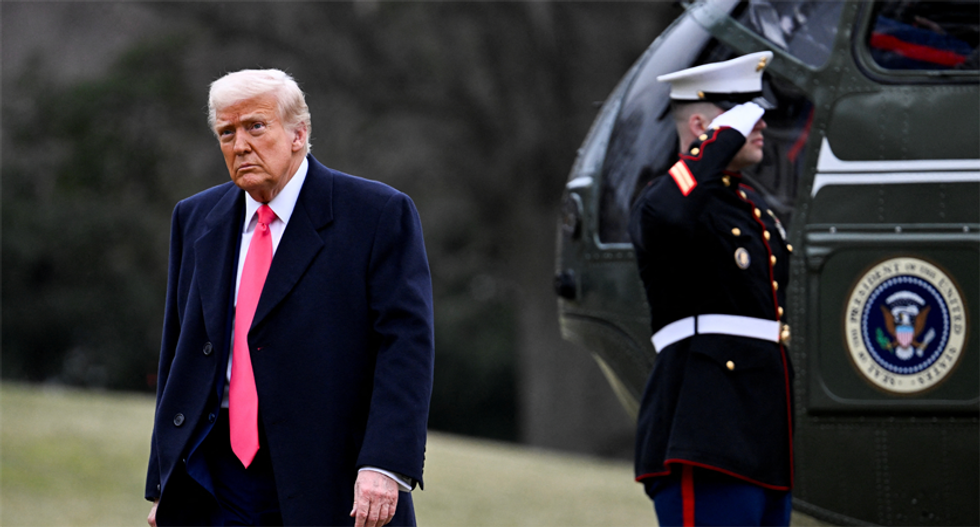Politics
Trump Sparks Outrage Over Nigeria Conflict Comments

US President Donald Trump has stirred controversy with recent comments regarding Nigeria’s ongoing ethnic and religious conflicts. In a series of statements, he threatened to reduce US aid to Nigeria and suggested the possibility of “fast and vicious” military strikes against groups he labeled as “Islamic terrorists.” This rhetoric has raised alarm among various stakeholders, who view it as an escalation of divisive language that could deepen global unrest.
The violence in Nigeria is multifaceted, with extremist groups like Boko Haram contributing to a tragic toll of over 20,000 civilian lives lost since 2020. Recent incidents, including the April massacre in Zike and a June bloodbath in Yelwata, have highlighted the severe humanitarian crisis faced by communities across the country. While it is undeniable that Christian populations have faced brutal attacks, it is essential to recognize that the situation affects all Nigerians, regardless of faith.
According to the Armed Conflict Location and Event Data Project, statistics reveal that more Muslims than Christians have suffered violence in recent years. Boko Haram has targeted worshippers in mosques and attacked markets in predominantly Muslim areas, indicating that the conflict is not a religious war but rather a complex interplay of poverty, land disputes, and radical ideologies that endanger everyone.
Trump’s framing of Nigeria’s crisis as an existential threat to Christians alone has been criticized as simplistic and harmful. By portraying the situation through a lens of religious intolerance, he risks inciting further division and misunderstanding. Nigerian officials have expressed their dismay at Trump’s comments, with Bola Tinubu, the President of Nigeria, describing the religious intolerance label as a distortion of the country’s reality. His presidential spokesperson, Bayo Onanuga, expressed shock at the suggestion of military intervention, underscoring the potential for such rhetoric to exacerbate tensions.
Critics argue that Trump’s approach reflects a broader pattern of seeking military solutions to complex issues. His first term saw significant controversies regarding foreign policy, and there are concerns that a second term could exacerbate existing problems in Nigeria. The idea of unilateral strikes could inflame ethnic tensions and resource scarcity, potentially leading to new waves of refugees and further instability.
Instead of military action, many advocate for a more nuanced approach to addressing the crisis. Solutions could include increasing humanitarian aid to displaced families, collaborating with the United Nations and African Union on security training, and employing diplomatic pressure on Nigeria’s government through constructive incentives rather than threats.
The current situation in Nigeria calls for international attention and engagement rather than militaristic bravado. The world is observing how the United States navigates its foreign policy, particularly under a leadership that has historically favored aggressive postures.
Trump’s statements not only misrepresent the reality of the conflict but also contradict the values of compassion and understanding that many Americans hold dear. As the situation evolves, it is crucial for US citizens and lawmakers to demand a foreign policy that promotes healing and collaboration, rather than one that risks dragging the nation into further conflict.
In summary, Nigeria deserves a thoughtful, comprehensive approach to its crises, one that prioritizes humanitarian concerns over military action. The stakes are high, and a misguided response could lead to devastating consequences for millions caught in the crossfire.
-

 Top Stories1 month ago
Top Stories1 month agoRachel Campos-Duffy Exits FOX Noticias; Andrea Linares Steps In
-

 Top Stories1 week ago
Top Stories1 week agoPiper Rockelle Shatters Record with $2.3M First Day on OnlyFans
-

 Top Stories6 days ago
Top Stories6 days agoMeta’s 2026 AI Policy Sparks Outrage Over Privacy Concerns
-

 Sports5 days ago
Sports5 days agoLeon Goretzka Considers Barcelona Move as Transfer Window Approaches
-

 Top Stories1 week ago
Top Stories1 week agoUrgent Update: Denver Fire Forces Mass Evacuations, 100+ Firefighters Battling Blaze
-

 Top Stories1 week ago
Top Stories1 week agoOnlyFans Creator Lily Phillips Reconnects with Faith in Rebaptism
-

 Top Stories5 days ago
Top Stories5 days agoWarnock Joins Buddhist Monks on Urgent 2,300-Mile Peace Walk
-

 Entertainment6 days ago
Entertainment6 days agoTom Brady Signals Disinterest in Alix Earle Over Privacy Concerns
-

 Top Stories1 week ago
Top Stories1 week agoOregon Pilot and Three Niece Die in Arizona Helicopter Crash
-

 Top Stories4 days ago
Top Stories4 days agoCBS Officially Renames Yellowstone Spin-off to Marshals
-

 Health2 months ago
Health2 months agoTerry Bradshaw Updates Fans on Health After Absence from FOX NFL Sunday
-

 Sports4 days ago
Sports4 days agoSouth Carolina Faces Arkansas in Key Women’s Basketball Clash



